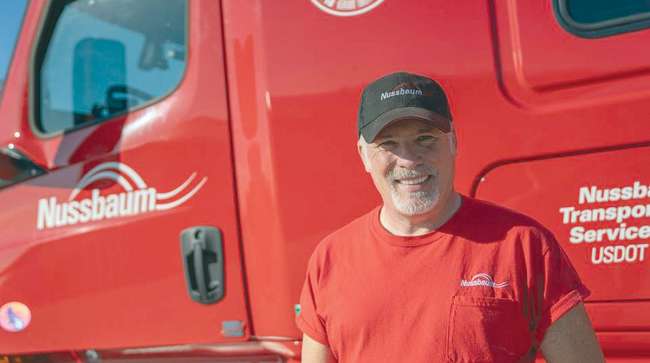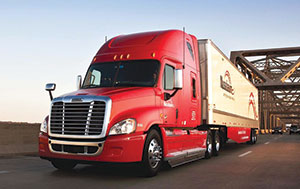Senior Reporter
Coaching Program Helps Drivers Develop Fuel-Efficient Habits

When Clark Reed of Nussbaum Transportation gets behind the wheel, he is always looking for ways to improve fuel efficiency.
“You gotta work at it — you gotta want to improve your driving skills, improve your economy, and you just have to follow the same process every day, every load, every time,” he said.

In our third episode of RoadSigns, we ask: Will your next truck be a plug-in? Hear a snippet from Mike Roeth, executive director of the North American Council for Freight Efficiency, above, and get the full program by going to RoadSigns.TTNews.com.
When it comes to fuel economy, Reed is the top performer at the Hudson, Ill.-based carrier, which nearly seven years ago instituted a program through which performance coaches work with drivers to improve the fleet’s fuel economy.
In the spring and summer of 2011, when diesel prices climbed above $4 a gallon, Nussbaum hired its first performance coach — a former company driver — to work closely with its 400 drivers to improve the fleet’s fuel economy. A second performance coach, also a former driver with a reputation as a strong fuel manager, was hired within the last 12 months.
“Hearing it from a peer, someone who knows what they’re doing and has done it himself, is just more credible, easier for guys to accept and buy into,” said Jeremy Stickling, Nussbaum’s vice president for human resources and safety. “It makes them a bigger believer.”
“You keep looking for little ways to improve,” Reed said. “You can’t control load weight, the weather, you can’t control anything except the way you drive the truck.”
The company believes the coaching system is working. When it started the program the fleet averaged 6.5 mpg; that average is now up to 9.3 mpg, an improvement of 43% over the course of the program.

Stickling
“There are a lot of little things that they can do to really improve their fuel mileage,” performance coach Cory Adams said. “I tell them every day to drive as if they are on ice, on snow-packed roads. You’re not wanting to take off fast, you’re not wanting to stop fast, you’re not wanting to change your momentum.”
Robert Braswell, executive director of the Technology & Maintenance Council of American Trucking Associations, noted that while the concept of fleets working with drivers to improve fuel economy has existed for years, the equipment fleets use has advanced.
“Progressive fleets have been doing this for years, but today the technology is better, and the equipment is better,” he told Transport Topics, pointing specifically to automated manual transmissions that can be programmed for fuel economy and onboard data recording devices that can report granular data on a truck’s performance. “These in-cab devices were simply not there 10 years ago,” he said.
Nussbaum uses an onboard camera system and other performance analytics, including throttle and speed data, to monitor driver performance. Coaches meet regularly with the drivers, discussing technique and reviewing data from the video and analytics, and also periodically ride along with drivers to observe and critique.
Reed has been recognized as one of the country’s most fuel-efficient drivers by the North American Council for Freight Efficiency’s “Run on Less” fuel- efficiency program, and Nussbaum is one of a few companies NACFE is aware of that has hired ex-drivers as coaches, said Mike Roeth, the industry group’s executive director. Roeth told TT that he has seen increased interest from companies to use mobile apps, web-based systems and other types of analytics to monitor and reduce fuel usage.
At about the same time as Nussbaum launched the fuel economy program it also updated its driver bonus program, based not only on fuel performance, but safety and operationally. The company said its top performing drivers are receiving bonuses up to $10,000 annually and about half of that can come from being fuel efficient.

Nussbaum Transportation nearly seven years ago instituted a performance coach program to improve fuel economy. (Nussbaum Transportation Services)
“That’s real money. We really try to get them to pick it up because they want to,” Stickling said.
Roeth noted that there are issues beyond fuel efficiency that companies must also prioritize.
“Fleet managers have a lot of problems to deal with and right now, keeping the trucks running, having drivers in the truck, are paramount with the high amount of freight that is out there,” he said. “They’re really focused on that. I think fundamentally they understand that focusing on fuel and drivers, coaches and so forth is the right thing to do.”
Adams noted that maintaining strong fuel economy results takes commitment.
“You can take advantage of those really good days when things are going with you, you can really get astronomical numbers,” he said. “And, of course, that will help on those days when everything is working against you.”
“It’s kind of depressing when I am not over 10 miles per gallon for a week,” added Reed, with a chuckle. “Couple years ago I would have been happy with nine. Now if I’m at nine, I’m thinking I did something wrong.”
He added, “Slow and steady gets it, but steady more than the slow.”




